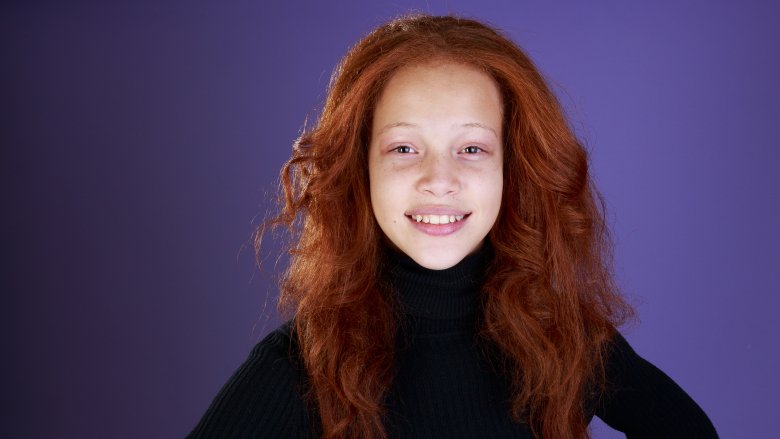The Truth About Redheads
They're fiery and dangerous, or they're clownish and weak. They're total geeks in public, but they're wild in the bedroom. They don't have souls, so they'll steal yours. The list of myths and stereotypes about redheads go on and on, showing just how stigmatized people with this unique phenotype really are.
But all of the joking about the red-headed step-child aside, it turns out that our ginger sisters and brothers really do have a special set of attributes that their blonde and brunette counterparts don't. While some of them are a bit predictable, other aspects really are quite fascinating — even advantageous at times!
So what's so special about our redheaded friends? What is it that makes their hair so crimson and their skin so pale? What mysteries are contained within their fair, carrot-topped bodies? Let's go ahead and set the record straight, so here's the go-to list for the truth about redheads.
It's a mutation!
Being redheaded isn't the same as being a blonde or a brunette, according to science. That's because our ginger baes are different on a genetic level, which may be why it's so hard to fake, at least convincingly. In fact, gingers specifically have a mutation on their MC1R gene, according to the National Institutes of Health. So now you can tell all of your redheaded friends that they're legit mutants.
So what does that mutation do, and how did it give Reba McEntire and Jessica Chastain those swoon-worthy locks? In a nutshell, it increases the amount of the red pigment (phaeomelanin) that gingers have, and decreases the amount of the darker pigment (eumelanin) they produce. That's what causes redheads to have fairer skin, freckles, pale colored eyes and, of course, red hair. That's also why redheads have to be careful in the sun, as they're more sensitive to sunlight due to the lack of eumelanin.
They are the two percent
Believe it or not, redheads account for only two percent of the population, worldwide, according to Red: A History of the Redhead by Jacky Colliss Harvey. It's more common in places like northern and western Europe, where redheads in turn make up higher percentages of the population. So for the most part, gingers are a rare breed, far outnumbered by the yellow and brown haired members of our species.
The main reason gingers are so rare is because being redheaded is a recessive trait. That means that in order to be born with those famous crimson locks, both parents have to be a carrier of the gene. They don't have to be redheads themselves, though, which is why gingers can sometimes be an unexpected surprise.
If you're a redhead with blue eyes, you're even more rare. The reason? Having blue eyes is also a recessive gene, according to Science Daily. Talk about a unicorn!
But they're in 30 percent of television commercials
Although redheads are only a small fraction of the world's population, they're over-represented in television commercials, according to a study conducted by social and traditional media analysis firm Upstream Analysis. Company president Janet Harris discussed the results in an article she penned for the Huffington Post.
Specifically, during peak television viewing hours, 30 percent of commercials will include at least one person with red hair. More often than not it's redheaded ladies who are spotted — they're twice as likely to be in a commercial than their male counterparts. And when you remove ads with no people in them from the equation, the percentage inches up to 33 percent. How's that for evidence that everyone loves a ginger?
Why are redheads in so many commercials? Some speculate that they're super photogenic, which could be a factor. Others point to the positive effects that seeing the color red has on our bodies. More research is needed to know for sure, so for now we'll just expect to see gingers on TV on the reg.
Not all redheads are white
When you close your eyes and picture what a redhead looks like, do you picture someone with long, straight hair and super pale skin like Nicole Kidman? Or perhaps you conjure images of Prince Harry on his wedding day. Certainly famous gingers like this get lots of attention for their unique looks.
But that doesn't mean that all redheaded people are caucasian with fine, straight hair. In fact, you don't have to be white to be ginger at all — there are indeed redheads of color, according to The Big Redhead Book: Inside the Secret Society of Red Hair by Erin La Rosa. Additionally, you can find redheads of color all over the world, according to an article in Vice magazine, thanks to human migration. In the article, Barry Starr, a geneticist from Stanford University, said, "Red hair carriers in the Caribbean and Africa are for the most part due to migration or gene flow." So the ginger gene is essentially an import in those areas. Fascinating!
Lady gingers are more sensitive to some pain (and painkillers) than others
The mutation on the MC1R gene that gives gingers their unique coloring doesn't just affect the way they look. In a curious twist, gingers also feel pain and respond to painkilling agents differently than their blonde and brunette counterparts.
For one, redheads are more sensitive to certain kinds of pain (thermal pain, which we'll discuss later), according to a study by the National Institutes of Health. In addition to that, the study also concluded that redheads are more resistant to lidocaine, a local anesthetic, than the rest of us. Plus, they need more anesthetic on the operating table, according to another study. So redheads aren't lying or being dramatic about the pain of medical and dental procedures — they're legit wired a little bit differently, and science proves it!
And that's not all, either. Apparently our redheaded sisters respond better to opiates than both men and non-ginger ladies, according to Science Daily. Who knew gingers had all kind of magic going on?
They're vitamin D machines!
There's even more sorcery afoot when it comes to redheads and their superpowers. According to The Big Redhead Book, gingers make more vitamin D in their bodies than the rest of us normies. That's due thanks to evolution, and to their concentration historically in cloudy European countries — both have helped them manufacture more vitamin D more efficiently today. By extension, then, gingers don't need to spend as much time in the sun as others do to hit their needed vitamin D levels. That's a good thing, considering how sensitive to the sun people with pale skin can be.
In addition to needing less sunlight, there are other advantages to being a super efficient vitamin D manufacturer. Specifically, gingers are less at risk for vitamin D deficiency, which means they're in turn less at-risk for conditions like diabetes, ricketts, and arthritis. Sounds like they may have won the genetic lottery.
Better fight-or-flighters
If you're ever in an emergency, you'd be fortunate to have a redhead on your squad to help you get through it. That's because redheads are super efficient with regard to adrenaline — yet another superpower our ginger brethren possess. We're beginning to suspect they might be superhuman with all of these genetic advantages!
The superior adrenal function that gingers possess is twofold: not only do they produce more of the hormone compared to regular folks, but they also can access it more speedily than the rest of us, according to Red: A History of the Redhead. That means that redheads can operate better in fight-or-flight situations, which would definitely give them a better chance of survival.
Could this be an explanation as to why redheads are known for having a fast and fiery temper? It's doubtful, but it does make you wonder what other impacts all that extra adrenaline might have on gingers.
Redheads may smell better than you
It sounds crazy, but it's true: redheads have such a unique biochemistry that they smell differently than the rest of the population, according to The Big Redhead Book. This was first recorded all the way back in 1866 by Dr. Augustin Galopin in his book Le parfum de la femme. In it, Galopin discusses his theory that women smell differently based on their hair color, and noted that redheaded women smelled like ambergris.
While Galopin's findings weren't exactly scientific, there's definitely science at work when it comes to the bouquet of gingers. That's because their skin mantle (the invisible, sebaceous layer over the skin) is more acidic than everyone else's. The result? When you spray perfume or apply scented oil to ginger skin, it smells different than it does on blondes or brunettes. It also doesn't last as long, so redheads may have to re-apply any scent sooner. What a bizarre phenomenon!
That's why she's always cold!
Do you have a ginger friend who's always complaining that it's too hot or too cold? Do you just write her off, thinking she's just being fragile? Or are you nice enough to stash a sweater in your car for the next time she needs one?
Well, once again, science is on the side of our redheaded friends. The same study that proved that gingers need more anesthetic than non-gingers also validated your cold redheaded friend, as it showed that redheads are more sensitive to thermal pain. That means she really is more vulnerable to the extremes of hot and cold temperatures. There's clearly no end to the mysteries!
So what is it about the MC1R gene that renders redheads so sensitive to more extreme temps? Turns out it may be causing the temperature-detecting gene to work overtime, so it's literally affecting how temperature is perceived on a genetic level.
Yes, there are disadvantages
It's clear that redheads have all kinds of superpowers that separate them from the rest of us normies. But being of the ginger tribe isn't always advantageous, especially when it comes to certain diseases and conditions, according to Red: A History of the Redhead.
For one, on top of not being able to tan well, redheads are more susceptible to developing skin cancers like melanoma, according to Science Daily. Fortunately, scientists have shown that there are ways to decrease the risk beyond limiting sun exposure, and they're hoping that their study will lead to the development of a pharmacological solution.
In addition to melanoma, another downer for redheaded folks is that they're more prone to Parkinson's disease, according to another study. That's because, as the study showed, mice with the MC1R gene produced less of the neurotransmitter dopamine in specific parts of their brain. Nerve cells that make dopamine were also more likely to get damaged, leading to a higher risk for the disease. Hopefully scientists will get to the bottom of that one, too!










